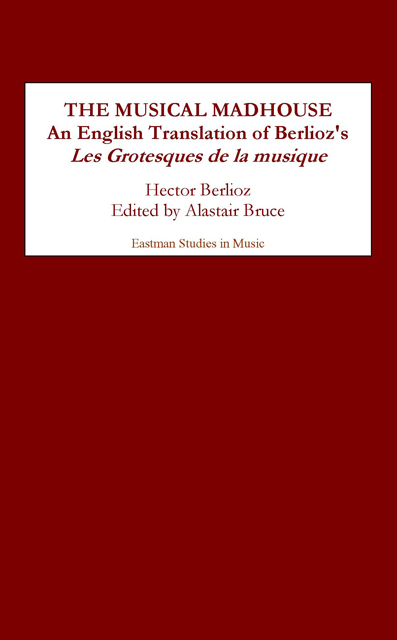Is it a joke?
Published online by Cambridge University Press: 21 March 2023
Summary
I had just conducted the second performance of my “dramatic legend” The Damnation of Faust in the theatre in Dresden. In the second act, during the scene in Auerbach’s cellar, the drunken students, after singing the song of the rat killed by poison in a kitchen, shout “Amen!” in chorus.
Let’s have a fugue for the Amen!
says Brander,
A fugue, a chorale!
Let’s improvise a masterpiece!
And off they go, taking up the theme of the rat’s song in a broader tempo, and producing a real classico-academic fugue, in which the chorus at times vocalises on “a–a–a–a” and at other times rapidly repeats the whole word, “amen, amen, amen”, accompanied by tuba, ophicleide, bassoons and double basses. This fugue is written in strictest accordance with the rules of counterpoint, and despite the senseless brutality of its style and the irreverent and blasphemous contrast intentionally created between the musical expression and the significance of the word “Amen”, because the use of these horrible travesties is allowed in all the conservatoires, the public is not at all shocked by it, and the harmonic effect which results from the musical texture of this scene is applauded wherever it is heard. It recalls the success of Oronte’s sonnet at the first performance of Molière’s Le Misanthrope.
After the obbligato pedal and the final cadence of the fugue, Mephistopheles steps forward and says:
By God, gentlemen, your fugue is very fine,
So much so
That hearing it one would think oneself in a holy place.
Permit me, pray, to tell you,
Its style is learned, truly religious,
One could not better express
The pious sentiments
Which the Church, at the end of its prayers,
Sums up in a single word, etc.
During the interval a music-lover came looking for me. No doubt this recitative had given him something to think about, for he accosted me with a shy smile:
“Your fugue on ‘Amen’ is meant as a joke, isn’t it?”
“Yes, Monsieur, I’m afraid it is!”
He wasn’t sure!
- Type
- Chapter
- Information
- The Musical MadhouseAn English Translation of Berlioz's <i>Les Grotesques de la musique</i>, pp. 18 - 19Publisher: Boydell & BrewerPrint publication year: 2003



